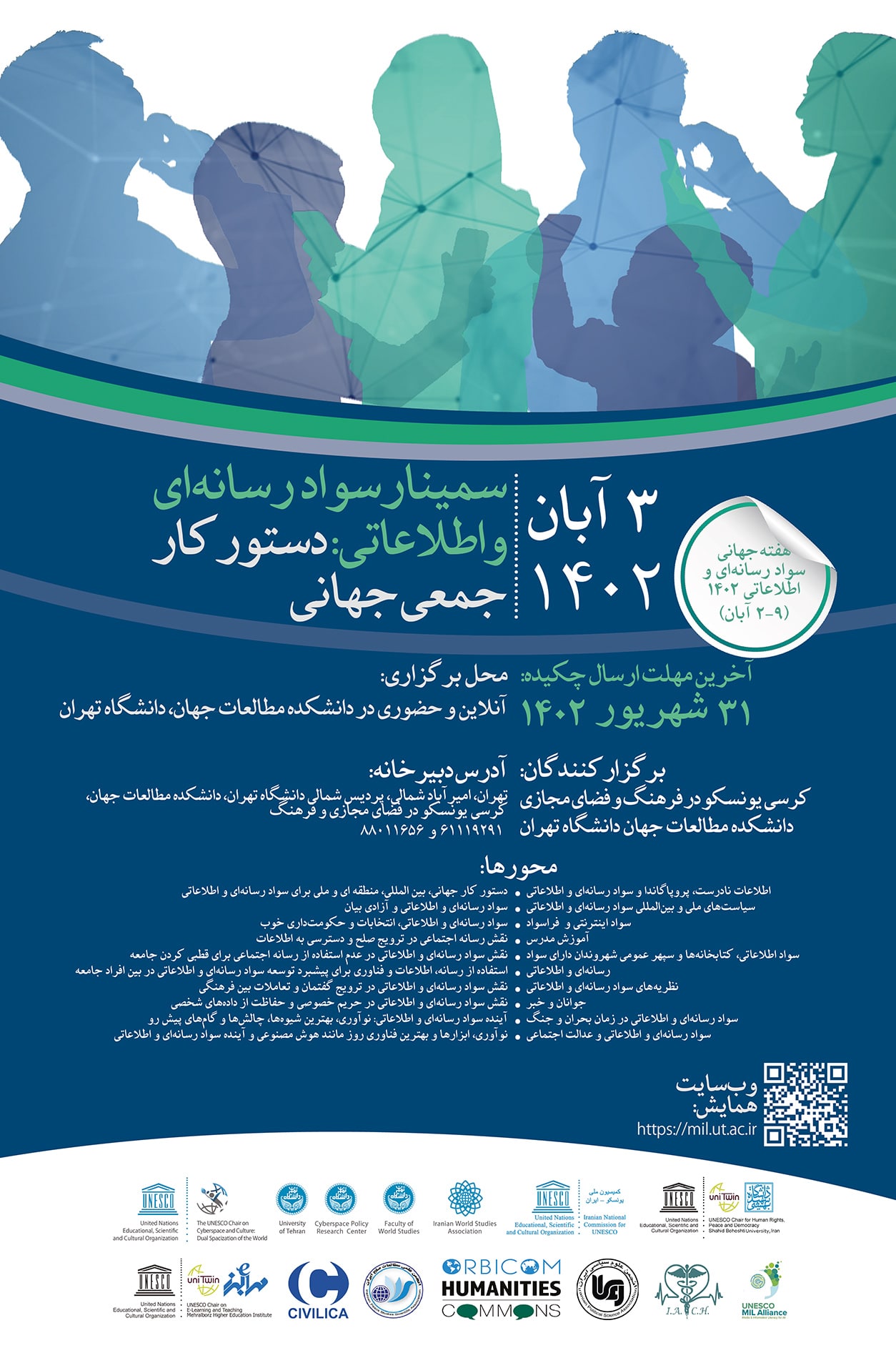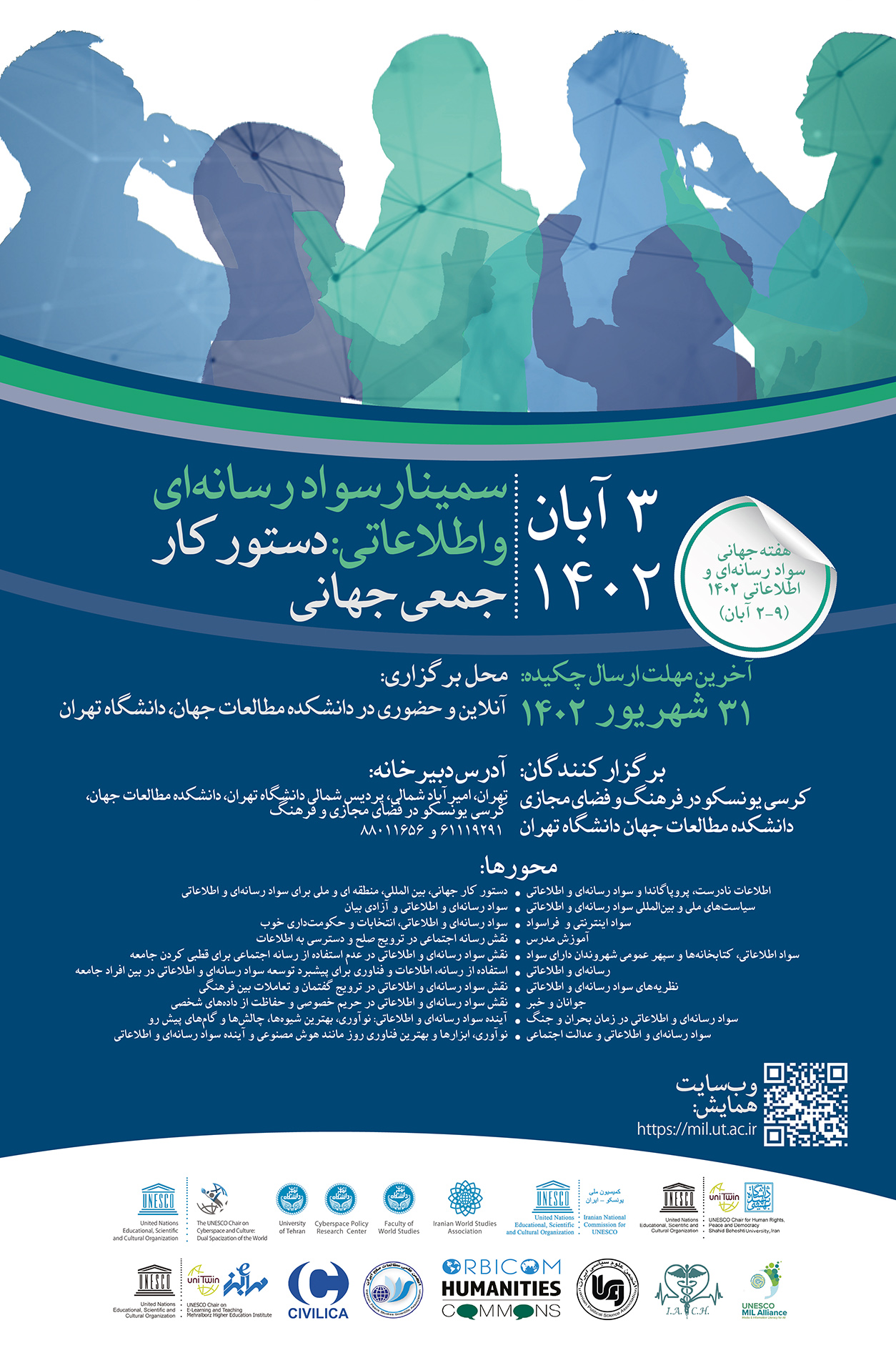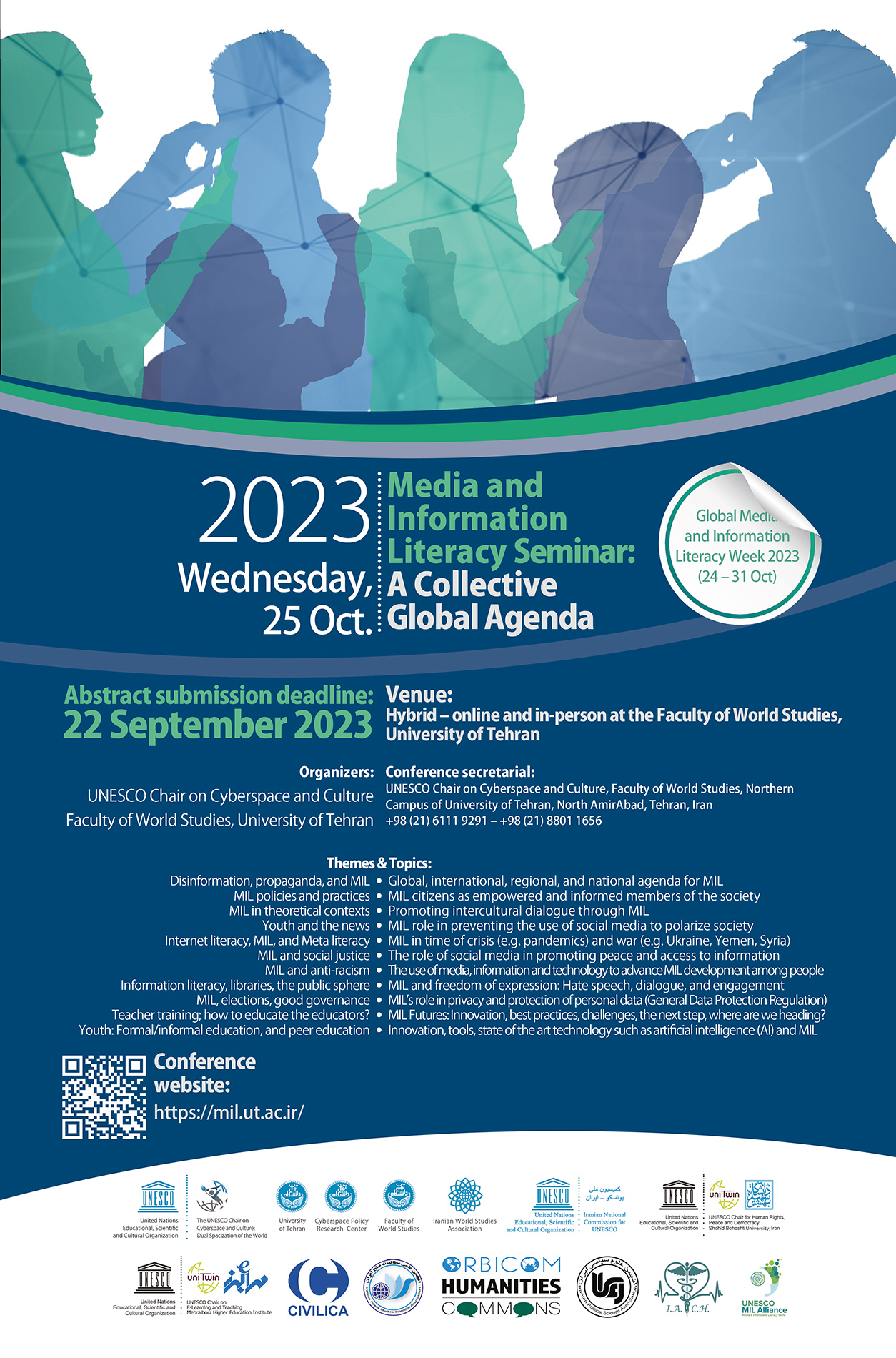
فراخوان ارسال چکیده سمینار سواد رسانهای و اطلاعاتی 1402
این سمینار با همکاری سازمانها، موسسات، و انجمنهای داخلی و بینالمللی به صورت آنلاین و حضوری در دانشکده مطالعات جهان، دانشگاه تهران برگزار میشود. شرکت در این سمینار رایگان و برای عموم آزاد است.
هدف از برگزاری سمینار سواد رسانهای و اطلاعاتی بررسی مفهوم سواد رسانهای و اطلاعاتی در خدمت منافع مردم و اشاره به چگونگی نقش آن در بهبود سطح اطلاعات، مشارکت، و توانمندسازی همگان میباشد. تلاش بر این است که با بررسی این مسائل، گامی در راستای دستیابی به نظام اطلاعاتی آزاد و کثرت گرا، ترویج توسعه پایدار، مشمولیت، برابری، گفتگوی بین فرهنگی، و پاسداری از دموکراسی برداشته شود. با توجه به اهمیت روز افزون سواد رسانهای و اطلاعاتی در حوزههای فرهنگی، آموزشی، سیاسی، و امنیتی کشور این سمینار پلتفرمی جهت شناسایی و ایجاد فضای گفتگو و تبادل تجارب بین استادان و پژوهشگران سواد رسانهای و اطلاعاتی ایجاد میکند.
در این راستا از کلیه اساتید، پژوهشگران، صاحبنظران، متفکران، و علاقهمندان دعوت میشود که برای تحقق اهداف یادشده، چکیدهی پژوهشهای خود را (بین 200 تا 300 واژه) در زمینه موضوعی یکی از محورهای کنفرانس به زبان انگلیسی یا فارسی تهیه کنند و حداکثر تا تاریخ 31 شهریور 1402 از طریق سامانه کاربران، بهصورت آنلاین به دبیرخانه کنفرانس ارسال نمایند.
- سیاستهای ملی و بینالمللی سواد رسانهای و اطلاعاتی
- سواد اینترنتی و فراسواد
- اطلاعات نادرست، پروپاگاندا، و سواد رسانهای و اطلاعاتی
- نقش سواد رسانهای و اطلاعاتی در عدم استفاده از رسانه اجتماعی برای قطبی کردن جامعه
- سواد رسانهای و اطلاعاتی، انتخابات، حکومتداری خوب
- سواد رسانهای و اطلاعاتی در زمان بحران (مثل پاندمی) و جنگ (مثل فلسطین، یمن، سوریه، افغانستان)
- نقش رسانه اجتماعی در ترویج صلح و دسترسی به اطلاعات
- استفاده از رسانه، اطلاعات، و تکنولوژی برای پیشبرد توسعه سواد رسانهای و اطلاعاتی در بین افراد جامعه
- سواد رسانهای و اطلاعاتی و عدالت اجتماعی
- آموزش مدرس
- سواد اطلاعاتی، کتابخانهها، و سپهر عمومی
- نظریههای سواد رسانهای و اطلاعاتی
- جوانان و خبر
- شهروندان دارای سواد رسانهای و اطلاعاتی
- نقش سواد رسانهای و اطلاعاتی در ترویج گفتمان و تعاملات بین فرهنگی
- سواد رسانهای و اطلاعاتی و آزادی بیان
- نقش سواد رسانهای و اطلاعاتی در حریم خصوصی و حفاظت از دادههای شخصی
- آینده سواد رسانهای و اطلاعاتی: نوآوری، بهترین شیوهها، چالشها، و گامهای پیش رو
- نوآوری، ابزارها، و بهترین فناوری روز مانند هوش مصنوعی و سواد رسانهای و اطلاعاتی
سایت همایش:
آدرس دبیرخانه: تهران، امیرآباد شمالی، پردیس شمالی دانشگاه تهران، دانشکده مطالعات جهان، کرسی یونسکو در فضای مجازی و فرهنگ
61119291 و 88011656
آخرین مهلت ارسال چکیده: 31 شهریور
Media and Information Literacy Seminar 2023:
A Collective Global Agenda
Call for Abstracts
The UNESCO Chair on Cyberspace and Culture and University of Tehran are organizing the 2023 Media and Information Literacy Seminar with the main theme of “A Collective Global Agenda” on Wednesday, 25 October 2023, which coincides with the World Development Information Day and United Nations Day.
The Sixth Media and Information Literacy (MIL) Seminar commemorates the 12th Global Media and Information Literacy Week 2023 (24 – 31 Oct) that highlights the 13th Media and Information Literacy and Intercultural Dialogue Conference and the seventh Youth Agenda Forum.
The annual Global MIL Week, initiated in 2012, is led by UNESCO in cooperation with the UNESCO MIL Alliance, the UNESCO-UNAOC MIL and Intercultural Dialogue (MILID) University Network, United Nations Alliance of Civilizations (UNAOC), and other partners. This week-long event offers an opportunity for all stakeholders to assess their progress towards “Media and Information Literacy for All”, and unites diverse actors committed to promoting MIL as a way to foster social inclusion and intercultural dialogue.
In line with the International Media and Information Literacy and Intercultural Dialogue Conference, and the Global MIL Week Youth Agenda Forum, 2023 MIL Seminar at University of Tehran aims to address the concept of incorporating MIL for the public good, and focus on how the global community can use Global MIL Week to build MIL as key to a vision of information as a public good and towards achieving Sustainable Development Goals (SDGs).
Amidst the rise of Information and Communications Technologies (ICT) that provides new solutions to development challenges and SDGs, MIL is an essential tool for people’s development. Through MIL individuals can mitigate the problems of potentially harmful content and reinforce rights to information and freedom of expression within the current complex of information ecosystem, and it can empower individuals to develop themselves and their societies through enhanced capacities in communication and information.
We hope to provide an engaging forum for the participants, and uphold the vision that MIL contributes to the public good, and progress towards the objectives of open and pluralistic information systems, promoting sustainable development, inclusion, equality, intercultural dialogue, and safeguarding democracy.
We welcome submissions of scholarly abstracts for oral presentation on all MIL-related topics, particularly the following:
- Global, international, regional, and national agenda for MIL
- Internet literacy and meta-literacy
- Internet literacy, MIL, and meta literacy
- Disinformation, propaganda, and MIL
- MIL’s role in preventing the use of social media to polarize society
- MIL, elections, good governance
- MIL in times of crisis (e.g. pandemics) and war (e.g. Palestine, Yemen, Syria, Afghanistan)
- The role of social media in promoting peace and access to information
- The use of media, information, and technology to advance MIL development among people
- MIL and social justice
- MIL policies and practices
- Teacher training; how to educate the educators?
- Youth: Formal/informal education, and peer education
- Information literacy, libraries, the public sphere
- MIL in theoretical contexts
- Youth and the news
- MIL citizens as empowered and informed members of the society
- Promoting intercultural dialogue through MIL
- MIL and freedom of expression: Hate speech, dialogue, and engagement
- MIL and anti-racism
- MIL’s role in privacy and protection of personal data (General Data Protection Regulation)
- MIL Futures: Innovation, best practices, challenges, the next step, where are we heading?
- Innovation, tools, state-of-the-art technology such as artificial intelligence (AI) and MIL
Timeline:
The deadline for submitting the abstracts is 22 September.
Abstract preparation:
The unstructured abstracts can be submitted in either English or Persian in about 300 (max 500) words.
1. Title
Concise and informative. Avoid abbreviations and formulae where possible.
2. Author names and affiliations
Please clearly indicate the given name(s) and family name(s) of each author and check that all names are accurately spelled. Present the authors' affiliation below the names. (in this format: Name, Department/Center/Faculty/College, Institution, City, Country) Indicate all affiliations with a lower-case superscript letter immediately after the author's name and in front of the appropriate address. You may include your ORCID, and list a secondary affiliation.
3. Corresponding author & presenter
If your paper has multiple authors, clearly indicate who will handle correspondence at all stages of refereeing, and who will present the paper at the Seminar. Their email should be provided listed.
4. Keywords
Provide four to six keywords representing the main content, and try to avoid general and plural terms and multiple concepts.
5. Biographies
A brief biography of the author(s) in about 30 words (min 20, max 40).
Submission:
All abstracts should be submitted on the Seminar’s website (https://mil.ut.ac.ir/ ) or in MS Word files to salehinejad[at]ut.ac.ir with “MIL Seminar 2023” in the subject line by 22 Sep 2023.
This seminar does not charge any submission or registration fees.
Presentations and proceedings:
The presentation language can be in either English or Persian. The proceedings will be published Civilica. Although the seminar only accepts abstracts, the authors are encouraged to submit an English Commentary (1500-4000 words) or an Article (6000-9000 words) for consideration for publication in Journal of Cyberspace Studies’ special issue on MIL. (https://jcss.ut.ac.ir/)
Conference secretarial:
UNESCO Chair on Cyberspace and Culture, Faculty of World Studies, Northern Campus of University of Tehran, North AmirAbad, Tehran, Iran
+98 (21) 61119291 – +98 (21) 88011656
Contact:
You may direct any queries regarding this event to Alireza Salehi-Nejad (salehinejad[at]ut.ac.ir) with “MIL Seminar 2023” in the subject line.



